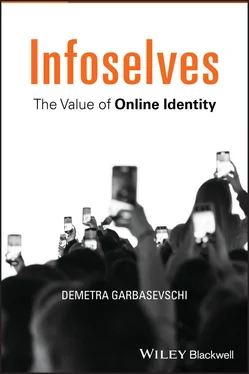Unfortunately, parents are losing their ability to parent because their automatic response is to give [their children] a phone, an iPad and to say watch this, play this.
(Mark Wentworth)
Schools around the world have, in their turn, only more recently begun to introduce digital literacy classes and the effects of these programs are difficult to evaluate at this point.
Considering this context, defining who we are and who we should be in the online environment has been mostly left to the commercial entities that operate the Internet economy. While we have been under the illusion that we can decide what to share about ourselves and who to share it with, we have been unknowingly and collectively led to share more and more personal information by an increasingly compelling online experience. This addictive loop can represent a development threat to the younger members of society. A quote from a 17-year-old included in a 2017 report on digital childhood by the UK’s 5 Rights Foundation 1is revealing for the exposed position of children and teens and points to the importance of formal online socialization:
There should be some sort of education in the general education system not only about all the sort of cyberbullying and stuff, but just generally about how the internet and companies on the internet work … and they’re not necessarily doing everything in your favour. Yes, it is great – the internet is amazingly useful, but you have to sort of know how to behave, not just about towards other people but how much data you should be giving out and what’s realistically going to be happening to it.
(Kindron and Rudkin 2017)
The commercial system of the Internet has perpetuated a tacit exchange that is by now widely acknowledged. It has granted users free access in return for their personal data. Asked, during his Congress interrogation, how his company is able to sustain a business model in which users do not pay for service, Mark Zuckerberg bemusedly replied: “Senator, we run ads!” In the book Paid Attention , author Faris Yakob appeals to a much-used phrase that is descriptive of this deal: “If you are not paying for an online service, then you are the product being sold” (2015, p. 59). While the reality of the online economy is more complex than this logic implies, it does revolve around the commodification of identity online, understood as its transformation into a valuable resource. The volume of information that people share intentionally or unintentionally about themselves every second means that entire life narratives can be reconstructed from various types of available data. The intention is not to simply connect this online data to a living, breathing individual in order to identify them. What is more important is to understand who that individual is, based on their online behavior patterns – including likes, dislikes, interests, groups, causes, or shopping and consumption habits – in order to build a reliable profile. Profiling allows for individuals to be classified into targetable values and lifestyle categories. Advertisers and other entities rely on the accuracy of these categories for their persuasive interests. Yet to say that commercial entities are the only ones to profit from the commodification of online identities would make a false claim. For the individuals themselves, online identity can be a driver of value, or – the opposite – of digital irrelevance or even stigma. Hence, the digital work put into producing an online identity able to potentially generate social or economic outcomes. This direction was set by the first user making a revenue as a result of their online profile (the term influencer had not yet emerged at the time) and has rapidly produced an economy of its own.
The phenomenon of online identity has become so important, so complex, and so problematic to individuals and society that it requires our full awareness and a relentless commitment to further exploration. And, while there has been steady progress in its observation and analysis (through the consistent contributions of social sciences and humanities researchers and writers, some of them highlighted throughout this book), we are undoubtedly only beginning to understand the meanings and consequences of extending our personal identities online at a global scale. Just like a collage that puts together existing materials to create new art, what this book offers is to put into perspective what has been said and written, in order to open doors towards new ways of looking at online identity as a phenomenon of our times. The focus remains on the identity of the individual, as opposed to, for example, the group or community, yet an individual who is naturally engaged in a diversity of social interactions. As such, of main concern are the external practices of identity construction and performance, as opposed to the internal processes of identity negotiation, although the constant dialogue between self-concepts, personal, and social identity is self-implied. The tension between the term “online identity” and the ideas presented throughout this book might have already become evident. “Online identity” implicitly positions itself versus its offline counterpart. Alluding to a separation between the online and the real-life selves leads to an ideology that is no longer sustainable in a hyperconnected world. Still, as with many other concepts, there is no widely accepted substitute and we continue to need this concept in order to explain a constellation of other ideas. Finally, the underlying red thread of the book is the idea of identity commodification. In a highly digitized society, we are our information and this information holds value for various stakeholders, including ourselves. The term “commodification” has historically been burdened with negative connotations. When preceded by the word “self” to form “self-commodification,” the negative effect is only amplified. The perspective of this book is grounded on the idea that the reputation of commodification is worth salvaging. Self-commodification can be neither good nor bad, as long as it is acknowledged and consented to by all parties involved in the exchange. It is only when we recognize this vantage point that we can begin to understand how we can capitalize on the value of our online identities.
The subject of the book has been addressed in four chapters. If this were a novel and online identity its main character, the plot would most likely lie outside the six universal types of storyline exposed with the help of data-mining technology (Technology Review 2016). With no clear idea about the future of online identity, we can only assume what turn its trajectory will take. And, with only two possible endings (on the one hand downfall, tragedy, demise; on the other ascent, accomplishment, success), the emotional arc of online identity’s narrative is still undecided. Expect no closure in this story, only an open-ended inquiry into the status quo .
The first chapter, “Identity and the Value of Self-Commodification,” is rooted in the assumption that our online identity has become a legitimate and implicit component of our identity system. The implication of this rather abstract claim is straightforward: to discuss who we are online , we must first understand who we are as individuals. This logic should justify the brief theoretical detour with which this book begins, and which summons some of the leading contributions within the social sciences in order to introduce the multi-dimensional system of self-identity and the fluid relationships between who we are, who we think we are, and who we are told to be. Our ideas of self and identity have evolved historically with society’s changing circumstances. The commercial takeover of late modernity has normalized commodification and has made promotionalism ubiquitous. As a consequence, identities too are increasingly evaluated as quantifiable goods, being both products of labor and valued objects of exchange for individuals and the commercial system of the Internet. Commodification has surreptitiously engulfed selves and identities.
Читать дальше











